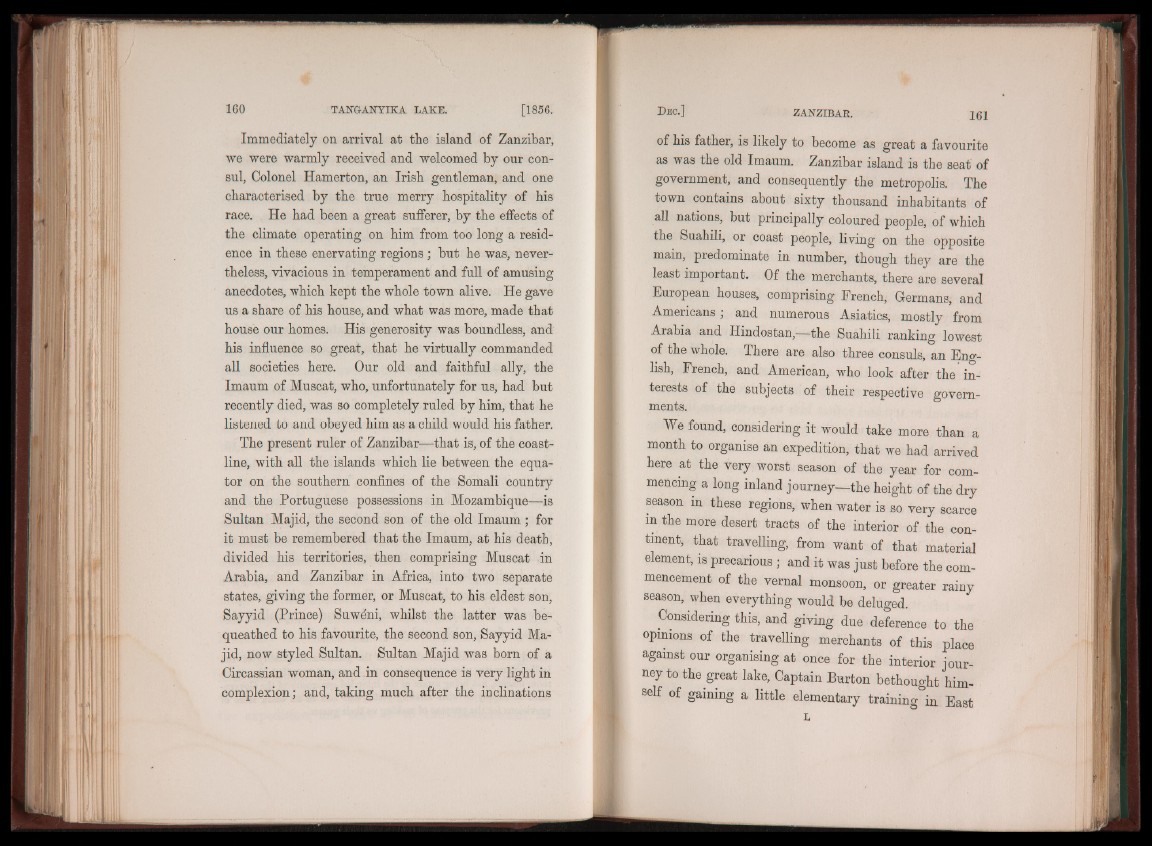
Immediately on arrival at the island of Zanzibar,
we were warmly received and welcomed by our consul,
Colonel Hamerton, an Irish gentleman, and one
characterised by the true merry hospitality of his
race. He had been a great sufferer, by the effects of
the climate operating on him from too long a residence
in these enervating regions ; but he was, nevertheless,
vivacious in temperament and full of amusing
anecdotes, which kept the whole town alive. He gave
us a share of his house, and what was more, made that
house our homes. His generosity was boundless, and
his influence so great, that he virtually commanded
all societies here. Our old and faithful ally, the
Imaum of Muscat, who, unfortunately for us, had but
recently died, was so completely ruled by him, that he
listened to and obeyed him as a child would his father.
The present ruler of Zanzibar—that is, of the coastline,
with all the islands which lie between the equator
on the southern confines of the Somali country
and the Portuguese possessions in Mozambique—is
Sultan Majid, the second son of the old Imaum; for
it must be remembered that the Imaum, at his death,
divided his territories, then comprising Muscat in
Arabia, and Zanzibar in Africa, into two separate
states, giving the former, or Muscat, to his eldest son,
Sayyid (Prince) Suweni, whilst the latter was bequeathed
to his favourite, the second son, Sayyid Majid,
now styled Sultan. Sultan Majid was born of a
Circassian woman, and in consequence is very light in
complexion; and, taking much after the inclinations
of his father, is likely to become as great a favourite
as was the old Imaum. Zanzibar island is the seat of
government, and consequently the metropolis. The
town contains about sixty thousand inhabitants of
all nations, but principally coloured people, of which
the Suahili, or coast people, living on the opposite
main, predominate in number, though they are the
least important. Of the merchants, there are several
European houses, comprising French, Germans, and
Americans; and numerous Asiatics, mostly from
Arabia and Hindostán,—the Suahili ranking lowest
of the whole. There are also three consuls, an English,
French, and American, who look after the interests
of the subjects of their respective governments.
We found, considering it would take more than a
month to organise an expedition, that we had arrived
here at the very worst season of the year for commencing
a long inland journey—the height of the dry
season m these regions, when water is so very scarce
m the more desert tracts of the interior of the continent,
that travelling, from want of that material
element, is precarious ; and it was just before the commencement
of the vernal monsoon, or greater rainy
season, when everything would be deluged.
Considering this, and giving due deference to the
opinions of the travelling merchants of this place
against our organising at once for the interior journey
to the great lake, Captain Burton bethought himself
of gaining a little elementary training in East
L